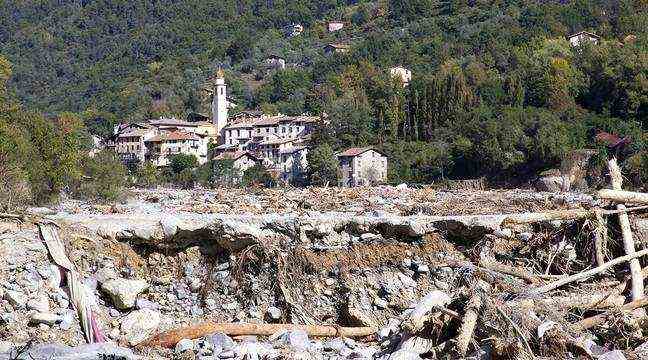A DNA analysis had confirmed it last January. It is indeed Josette Borello’s leg that was found in November 2020 more than 600 km from the Vésubie valley, off Narbonne. This 84-year-old pensioner swept away with her husband by the devastating floods of October 3, 2020 in the Alpes-Maritimes was the tenth and last victim of the storm formally identified.
Eight other people were still missing since. But the investigation is now closed and they will very soon be officially declared dead, announces to 20 minutes the public prosecutor of Nice. A step eagerly awaited by families.
“For the moment, the file is closed”
“There has been a tremendous amount of research and resources implemented, including across the border, in Italy and off Monaco. Mud piles were probed. Specialists from the Criminal Research Institute of the National Gendarmerie [IRCGN] came on site. Speleologists intervened. Dogs too. It is possible that more bodies will reappear one day or another, in which case new investigations will be opened. But for the moment the file is closed. We felt that we had done the tour, ”explains Xavier Bonhomme.
Closed since the month of June, this “extraordinary” investigation, complicated by the destruction of two cemeteries in the affected valleys, had mobilized “hundreds of people on the ground”, further recalls the magistrate. It will now be able to give rise to judicial declarations of death, more than a year after the facts. “As in the context of an air disaster, there is no chance that these people have remained alive, so justice can rule,” said Deputy Prosecutor Parvine Derivery, who particularly followed the file of the storm Alex in the Alpes-Maritimes.
Two still unidentified missing
Seized by the families or in certain cases by the association of assistance to the victims, the civil court must hold a first hearing in this direction on October 20. “It is also possible that decisions will be rendered without a hearing if the parties agree”, indicates Xavier Bonhomme. And the expectation was great on the part of some families. In Nice morning, the son of the couple Borello explained that “without this act, mourning is impossible”. “Today, everything is blocked, described in May Eric Borello. The notary cannot open the inheritance file. Social Security, like insurance, requires death certificates. My parents continue to receive their pensions. That’s crazy ! “
If eight people are indeed missing, these judicial declarations can only concern six of them. At least at this point. “For the other two, we have no identity, no other declaration of disappearance, adds Parvine Derivery. However, we are certain that there are these two other victims. We have recorded a great deal of testimony around a car that was swept away in the Roya valley and in which all the people interviewed saw a man and a woman. “
For the six identified missing persons, born between 1921 and 1988, the families will therefore be able to obtain a death certificate. The youngest is a volunteer firefighter. The body of his colleague with whom he was traveling in Roquebillière when the road collapsed under their vehicle had been discovered five days after the incident. His remained nowhere to be found.
The complexity of the investigation with the destruction of two cemeteries
For justice, which did not have to manage complaints on possible responsibilities, unlike the floods of October 2015, this will be the conclusion of a truly unique investigation, repeats the public prosecutor. “It’s totally out of the ordinary already because of the damage, the brutality of the disaster. I thought we would have a much greater human toll, he says. The investigation is also out of the ordinary because of the destruction of two cemeteries in Saint-Delmas de Tende and Saint-Martin-Vésubie, of which 400 bodies were taken away. It further complicated matters for the identification of the victims of the storm. “
“After four to five days in an aquatic environment, it becomes very difficult, if not impossible, to determine whether it is the body of a recently deceased person or whether it is a question of an older death” , explains a gendarme. The IRCGN teams were able to rely on the care that may be given to buried bodies, identification bracelets or coffin numbers. A “mobile DNA laboratory” of the national gendarmerie had also been dispatched to the site. “But DNA does not like sea water at all”, also explains the specialist, and “as a last resort, there is dentistry”.
Finally, at least 35 remains belonging to different bodies from the two cemeteries were found in the Roya valley, 23 in the Vésubie valley and two others on the coast.

